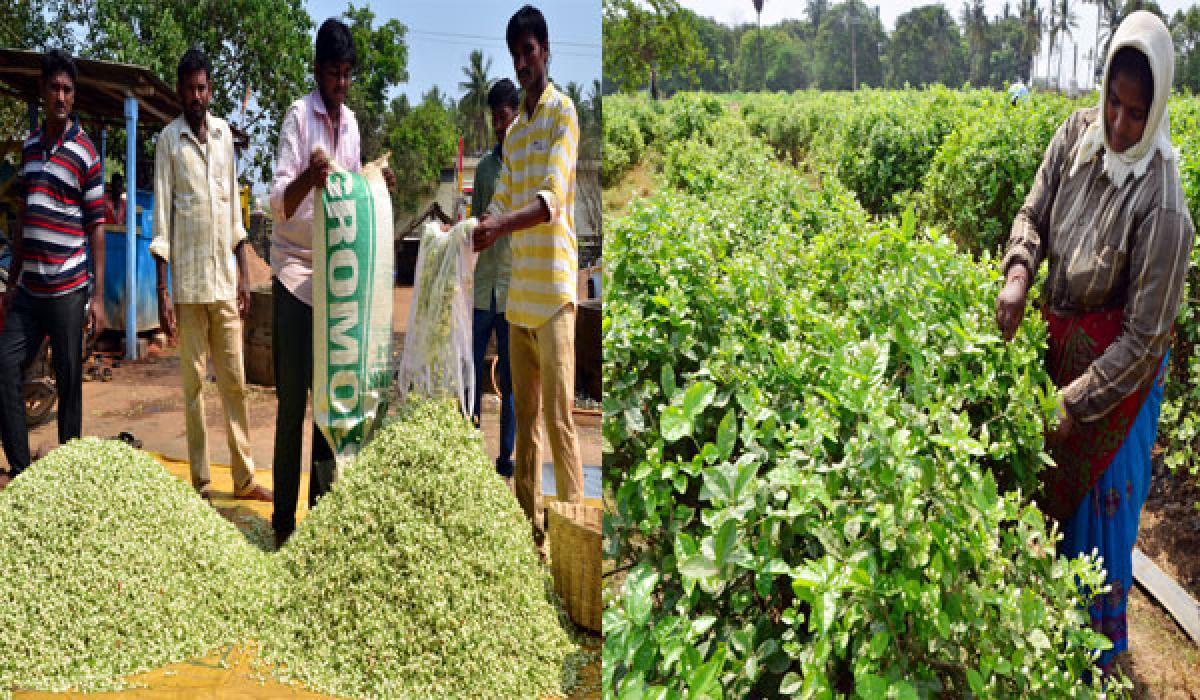Live
- Delhi-based political parties are like East India Company: Sukhbir Badal
- Golf: Diksha moves into Top-20 at South African Women’s Open
- KCR lashes out against BJP and Congress for destroying Telangana
- Dairy Science students visited the Milk cooling plant
- Moody feels Pant ahead in keepers’ race for T20 WC squad; Srikkanth picks Rahul over Samson as reserve keeper
- Thanking voters for extending 'unparalleled support' to NDA, PM Modi says second phase 'too good'
- Natural Relief for Menstrual Cramps: Beetroot Juice Recipe
- Asha Worker died in a road accident
- Akshaya Tritiya 2024 Auspicious Hindu Festival on May 10th
- Celebrating World Veterinary Day 2024: Safeguarding Your Pet’s Vision with Expert Tips
Just In

The growing of jasmine has become a gambling of sorts for majority of farmers residing in Mylavaram mandal of Krishna district, courtesy price fluctuations.There are about 1,000 farmers, who are dependent on the cultivation of jasmine. It is cultivated in more than 200 acres in the mandal, which is the Assembly constituency represented by water resources minister Devineni Uma Maheswara Rao.
Mylavaram (Krishna): The growing of jasmine has become a gambling of sorts for majority of farmers residing in Mylavaram mandal of Krishna district, courtesy price fluctuations.There are about 1,000 farmers, who are dependent on the cultivation of jasmine. It is cultivated in more than 200 acres in the mandal, which is the Assembly constituency represented by water resources minister Devineni Uma Maheswara Rao.
Highlights:
- Price fluctuation is landing growers in losses
- One kg jasmine which is sold at Rs 120 is dropping down to Rs 40 by noon
- Farmers demand a monitoring authority to ensure price stability
Jasmine is mainly grown in Chandragudem, Murusumalli, Pulluru, Kothagudem, Budava, Ramachandrapuram, Pondugula and Velvadam. Farmers in these villages sell them at Chandragudem market yard, and traders who buy them will supply the same to Hyderabad, Vijayawada, Eluru, Kodada, Rajahmundry, Vizag and other places.
Jasmine flowers of Chandragudem are famous for its fragrance and it is even exported to neighbouring states. According to Bhadram Appa Rao a farmer, price fluctuations are leading them to huge losses. “I am growing jasmine in one acre and each day we used to pluck 30-40 kg of flowers. The season will be five months starting from January to May, where we have to pluck the flowers everyday in the morning or else they will get perished.
On April 17, I sold one kg of Jasmines at Rs 60 per kg. The other day it was Rs 100 per kg. I don’t know what will be the price tomorrow. I have to engage 7 to 8 workers to pluck the flowers, where they will charge Rs 40 per kg. Even I am not able to get back the labour charges,” he rued.
When The Hans India team visited the market yard at Chandragudem, hundreds of farmers are busy in selling flowers to the traders directly. The price, which was at Rs 120 per kg at 9am decreased to Rs 100 per kg by 10 am and traders from Vijayawada, Rajahmundry and other places were seen waiting for even more dropping of prices.
Market committee in-charge P Nageshwar Rao, who is also a commission agent, says that depending upon the quality of flower, the price varies. “3-4 tonnes of flowers are being supplied to Hyderabad alone. The price fluctuates between Rs 100-40 per kg according to the demand and supply. In the peak summer season, where marriage season will commence, then the price will rise to even Rs 150 per kg. We will charge Rs 10 per kg as commission. Due to heavy yield in this season, the price of jasmine is also much less,” he opined.
S Krishna Murthy, a farmer from Pullur has expressed deep anguish over the price drop. “There should be some monitoring authority over the prices of the flowers. Every day, I am engaging more than 20 workers for plucking flowers, which is a tiresome job. They will start the work early in the morning at about 4 am and I have to rush the flowers to market yard as early as possible. The prices which are at Rs 120 per kg in the morning are falling down to Rs 20-30 by noon,” he lamented.
By T Sudhakar

© 2024 Hyderabad Media House Limited/The Hans India. All rights reserved. Powered by hocalwire.com







